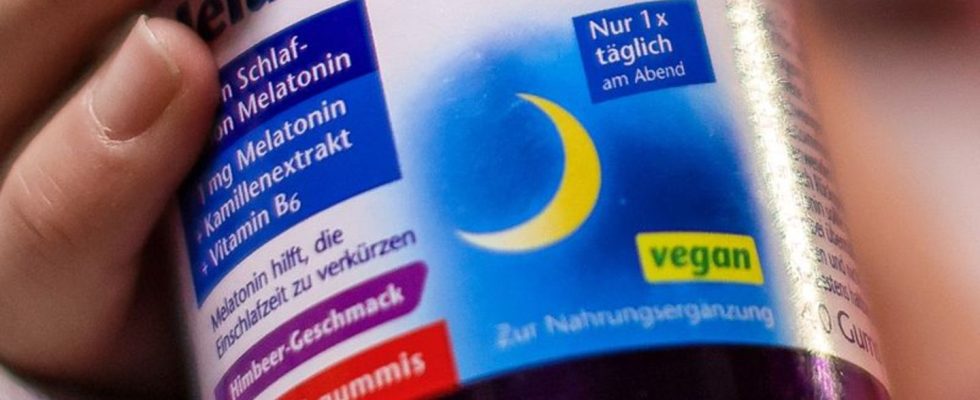Gummy bears with melatonin are intended to enable children to sleep quickly – and parents to have a stress-free evening. The dietary supplement is trending on social media. Doctors consider this risky.
The woman in the TikTok video secretly mixes melatonin gummy bears into a bag of candy and hands them to her child. Cut, next sequence: The child is lying in his bed and sleeping soundly. Videos like these abound on social media. With titles like “How to Get Your Child to Sleep in Under 5 Minutes,” parents promote melatonin supplements as an absolute miracle cure for children who just won’t fall asleep.
In fact, melatonin plays an essential role in falling asleep. The natural hormone is produced in the pineal gland in the human brain and is activated when it gets dark. “Everyone knows vitamin D, it is the hormone of the day,” explains pediatrician Ekkehart Paditz, who is a member of the German Society for Sleep Medicine and Sleep Research (DGSM). “Melatonin is the antagonist, it is the hormone of the night.”
There are numerous over-the-counter dietary supplements containing melatonin available online and in drugstores, most of which are for adults. They promise quick sleep and an end to sleep disorders. They are available in the form of tablets, sprays, teas, drops and gummies.
Little is known about melatonin metabolism in infants
Pediatrician Paditz advises against giving one of these products to your own children without consulting a doctor. So far, too little is known about the breakdown pathways of melatonin in infants and small children, says the doctor. What is certain is that their melatonin metabolism is slower. In addition, there are significant concentration fluctuations in the nutritional supplements tested in studies. “It would be disastrous if parents spent money on bags that don’t come from the doctor’s prescription pad or the pharmacy.”
More than 700 products containing melatonin have been reported to the Federal Office of Consumer Protection and Food Safety (BVL) since 2011, a spokesman said upon request. But that doesn’t mean that each of the products was brought onto the market.
According to Paditz, there have been several deaths of small children in the USA in recent years that were linked to greatly increased melatonin levels. In a US study, researchers reported, among other things, a case in which parents regularly gave their three-month-old child between eight and ten doses of a high-dose melatonin product per day. It could not be conclusively clarified whether an overdose of the hormone led to the child’s death.
Melatonin can be prescribed by prescription
If children suffer from serious sleep disorders, parents should not rely on over-the-counter remedies, says Paditz. “Parents run quite a risk that potentially serious illnesses may be overlooked.” A brain tumor, for example, can also cause sleep disorders. The pediatrician therefore advises: “Children belong to the pediatrician.”
Melatonin can be prescribed by prescription for affected children and adolescents. A corresponding medication for children aged two and over has been available in Germany for several years. “An approved medication that is dispensed through the pharmacy obviously offers much greater security,” says Paditz.
The health insurance company only covers the costs of the preparation in two specific cases. On the one hand, this applies to children with an autism spectrum disorder, of whom, according to Paditz, between 20 to 40 percent suffer from sleep disorders. On the other hand, the costs are covered for minors with Smith-Magenis syndrome, a rare disease in which the day-night rhythm is disturbed.
According to Paditz, the dose should generally be as low as possible. Depending on your age, he recommends taking between 0.25 and 0.5 milligrams of the melatonin medication before bed.
At the DGSM annual congress, which will take place between December 7th and 9th in Berlin, he and his colleagues want to present a medical guideline for the use of melatonin in children and adolescents with sleep disorders. According to the manufacturers, the gummy bears with melatonin sometimes contain between 0.5 and 1 milligrams of melatonin per gummy.
Pediatricians recommend sleep routines
The drug is rarely used in practice, says Jakob Maske, spokesman for the professional association of pediatricians. “Sleep disorders requiring treatment occur primarily in severely chronically ill children with intellectual disabilities who have difficulty falling asleep at a young age,” says the pediatrician. He warns against using melatonin uncritically.
Rather, it is important to find out what the cause of the sleep disorder could be when you visit a doctor. “We see again and again that children and young people have problems falling asleep because they use their cell phones excessively or watch films before falling asleep,” says Maske. “Most of the time, the problems go away when parents follow the tips for introducing sleep hygiene.”
According to Paditz, this includes developing routines and winding down before going to sleep. Finally, stress, worries and fears also play a role in falling asleep. Parents could give children a soothing pat on the head in bed, read them a book, or sing a lullaby.

